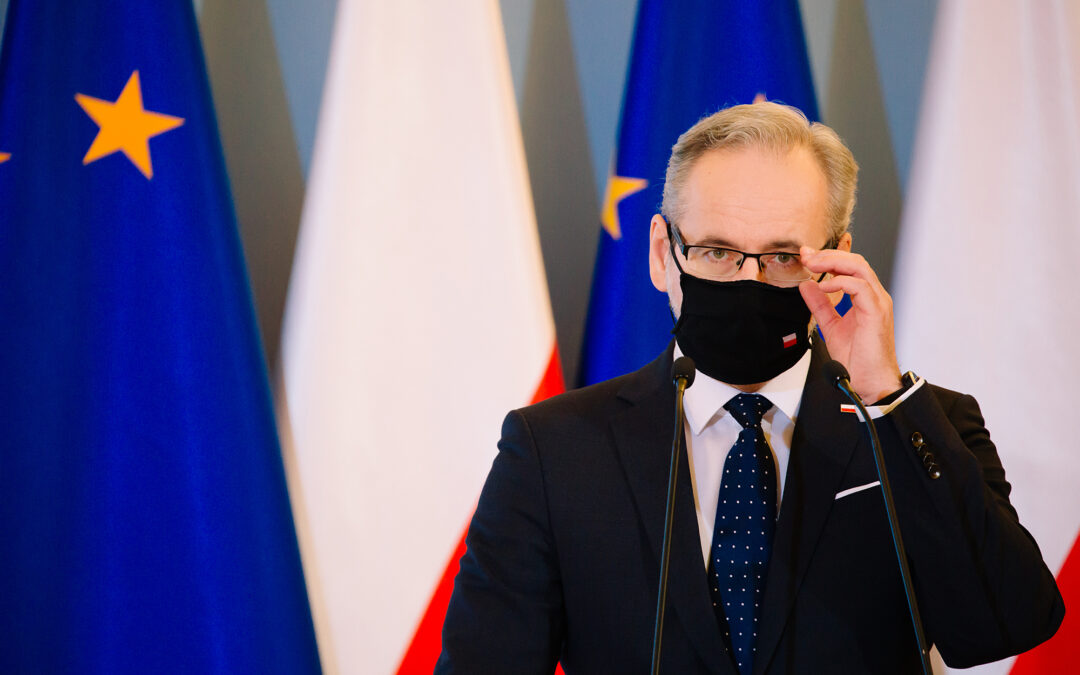Poland’s government has announced the loosening of coronavirus restrictions, including the reopening of schools, shortening of isolation for people infected, and reduced quarantine requirements. Remaining restrictions could be lifted next month, says health minister Adam Niedzielski.
“We are dealing with the beginning of the end of the pandemic,” Niedzielski told a press conference this afternoon. “This is the first step in the return to normality.”
The rolling average of new COVID-19 cases has been falling in recent days, showing that “the peak of the fifth wave is clearly behind us”, said Niedzielski, quoted by Rzeczpospolita.
He also noted that, although Poland has recently seen a spike in infections, the number of people hospitalised is decreasing. It is clear that the “course of COVID-19 cases is milder during the fifth wave” of the virus, which has been dominated by the Omicron variant, added the minister.
The number of people currently hospitalised with COVID-19, 18,952, is slightly lower than yesterday’s figure of 19,014. Previously, however, the number had been rising constantly since late January, when it stood at around 13,500.
The current figure remains below the peak of almost 25,000 seen during the fourth wave and the record high of almost 35,000 in April last year. Warnings by the government’s chief Covid advisor that Omicron could cause hospitalisations to reach 50,000-60,000 have so far not come to pass.
Among new measures announced today was the shortening of the isolation period for people infected with coronavirus from 10 days to seven. Quarantine for people living together with an infected person will also now end at the same time as the latter’s isolation period.
Quarantine for people who have had contact with an infected person will also now be abolished entirely and people required to quarantine upon entering Poland will have to do so for seven days instead of the previous 10 or 14, reports Rzeczpospolita.
Speaking alongside Niedzielski, education minister Przemysław Czarnek also revealed that the current requirement for children in grades five and upwards to be taught remotely will end a week earlier than planned.
“Schools will return to in-person education on 21 February”, which will be the “definitive end of remote learning”, Czarnek declared.
Minister @a_niedzielski w #MZ: Od 15 lutego będziemy stosowali 7-dniową izolację. Zmieniamy też zasady dot. kwarantanny. pic.twitter.com/5Wm9ZxLU04
— Ministerstwo Zdrowia (@MZ_GOV_PL) February 9, 2022
Earlier today, in an interview with Fakt newspaper, Niedzielski had revealed that the government was putting in place plans to “withdraw restrictions step by step” and that, “if the [current] rate of decline in infections continues, there is a very realistic prospect of removing all restrictions in March”.
This would include an end to masking requirements, though the minister added that it would still be recommended for people to wear them, especially in places such as public transport.
"Coronavirus is slowly starting to turn into a relatively normal flu", says Poland's President @AndrzejDuda.
"Everything seems to indicate that this new variant, although more contagious, is milder" https://t.co/pJsDrSJebU
— Notes from Poland 🇵🇱 (@notesfrompoland) February 1, 2022
Main image credit: Krystian Maj/KPRM (under CC BY-NC-ND 2.0)

Daniel Tilles is editor-in-chief of Notes from Poland. He has written on Polish affairs for a wide range of publications, including Foreign Policy, POLITICO Europe, EUobserver and Dziennik Gazeta Prawna.




















